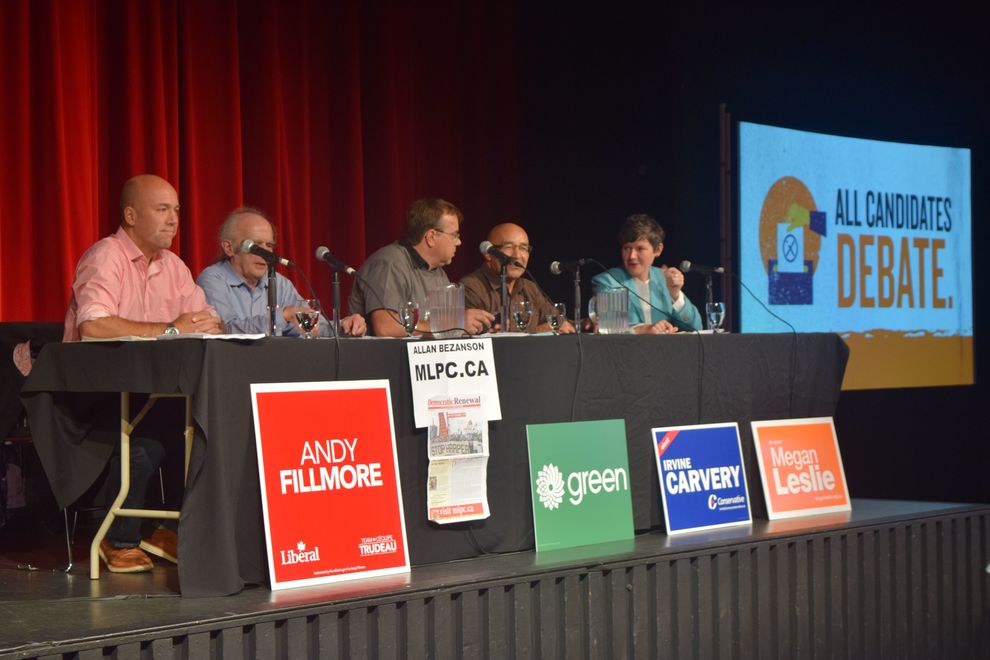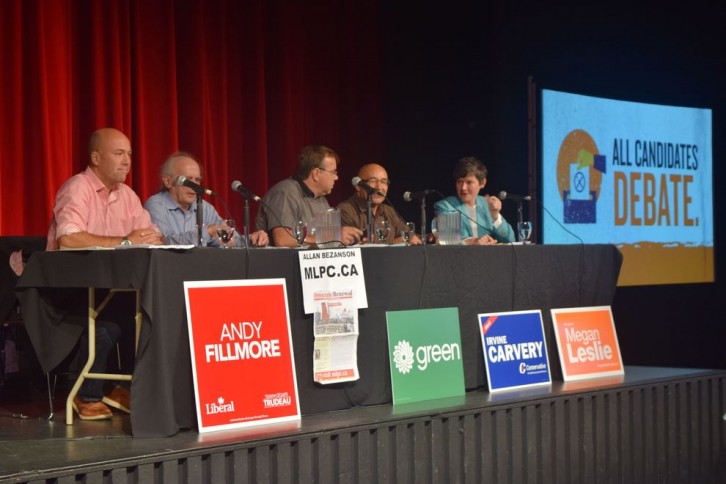Politician Summit
Students pose tough questions at candidates debate
Monday's federal election debate at Dalhousie addresses student debt, women's issues and sustainable energy

caption
Liberal candidate Andy Fillmore, Marxist-Leninist candidate Allan Bezanson, Green Party candidate Thomas Trappenberg, Conservative candidate Irvine Carvery, and NDP candidate Megan Leslie (left to right) during tonight's debate.Students pushed equality and institutional change when they posed questions to Halifax-region Member of Parliament candidates at Monday’s debate on youth and student issues.
Candidates were probed on issues of student debt, scientific research funding, renewable energy, inequity for women and marginalized communities, and the Fair Elections Act.

caption
Liberal candidate Andy Fillmore, Marxist-Leninist candidate Allan Bezanson, Green Party candidate Thomas Trappenberg, Conservative candidate Irvine Carvery, and NDP candidate Megan Leslie during tonight’s debate.The debate, attended by approximately 250 people in the Dal Student Union Building, was hosted by the Dalhousie Student Union and by the Nova Scotia chapter of the Canadian Federation of Students.
This was the third public debate for candidates in the federal riding of Halifax. The participants were incumbent NDP Member of Parliament Megan Leslie, Green Party nominee Thomas Trappenberg, the Liberal Party’s Andy Fillmore, Conservative candidate Irvine Carvery, and Marxist-Leninist candidate Allan Bezanson.
One student raised the concern of student debt. The Canadian Federation of Students cites that the average Canadian student will graduate with $27,000 of debt.
The responses from Leslie and Trappenberg were similar: cut tuition and make education more accessible, as in European countries with zero-tuition models.
Fillmore cited his party’s platform promising an investment in economic infrastructure and a commitment of $40 million for paid co-op placements for young people. Carvery related his party’s promise to reduce interest rates on loans and provide new jobs to alleviate student debt
Statistics from the Maritime Provinces Higher Education Commission state that Nova Scotia will remain the most expensive Maritime province for a post-secondary education in the upcoming year.
Last week’s slew of sexual assaults in the Halifax Regional Municipality, as well as last school year’s Dalhousie Dentistry scandal were alluded to in an audience member’s question for the candidates, as she claimed that young people “deserve to feel safe on campus and in [their] communities.”
“I don’t know how to solve it,” said Trappenberg frankly of the crisis. “We have a really deep problem.”
Trappenberg and Carvery both said the the public school system needs to further educate Nova Scotia young people about gendered violence.
Leslie claimed the community needs a “holistic approach,” that will examine issues through lenses of gender and consent.
Fillmore pointed to a similar approach.
“Truth is, it’s going to take every man in this room to end gendered violence against women,” he said, adding that if elected, Liberal Party leader Justin Trudeau promises to have a cabinet comprised of 50 per cent women.
When a student demanded increased research funding, Trappenberg took the stage. A Dalhousie professor in neuropsychology, he rhetorically asked, “Why haven’t we cured cancer yet?”
Referring to the former Conservative government’s preference for private-sector science funding models, Trappenberg said many of his colleagues have left the field of scientific research and that many more will if the model does not change.
“Trust scientists,” Trappenberg said.
When pressured to state their stance on divestment from fossil fuels and the implementation of renewable energy policies, the candidates responded with varying degrees of urgency.
“We can’t do it tomorrow,” said Carvery. “My house is heated by oil. What would I do if there was no oil to heat my house?”
“It can’t happen tomorrow,” echoed Leslie, adding, however, that “it should’ve started yesterday. It’s too important not to.”
Trappenberg closed the debate by imploring students to go to the polls: “I know it takes a lot of guts, but go and vote.”

